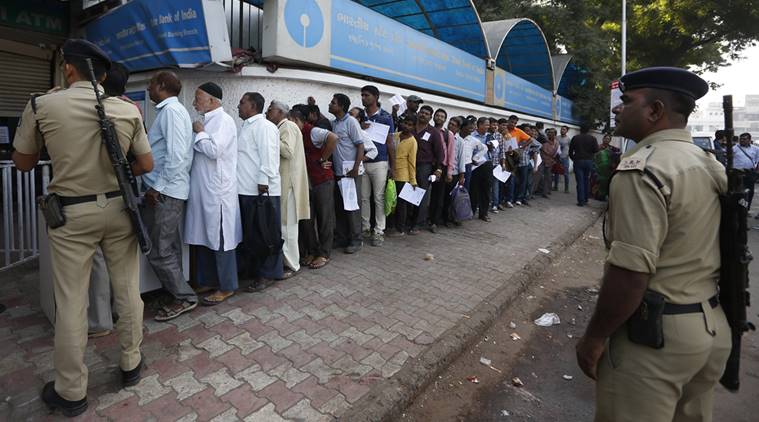
If not treaded carefully, banks may be next hotspot of coronavirus in India
without proper guidelines regarding the functioning and regulation of the crowds at banks, soon they might turn into the hotspot of coronavirus, a bank employee said.

When the government ordered the 21-day lockdown to contain the spread coronavirus, it exempted Banks, essential shops, hospitals and other institutions of public need.
However, without proper guidelines regarding the functioning and regulation of the crowds at banks, soon they might turn into the hotspot of coronavirus, a bank employee said.
Dhananjay Kulkarni, Secretary, All India Bank of Maharashtra Employee’s Association added that the two important things that need to be addressed while running the banks during lockdown is, the safety of bank employees, customers, and the rules to follow the preventive measures to curb the spread.
With the end of the financial year and the start of a new month, Prakash Kadam, a worker at Bank of Maharashtra said, pensions and direct benefit transfers (DBT) will be deposited in the beginning of April which might lead to overcrowding at the branches.
Sometimes, the lines are nearly two kilometers long he added.
To avoid such happenings, workers at Banks want the government to come out with clear instructions and regulations for banks.
Related news: COVID-19 cases spike to 234 in TN as 110 test positive in single day
Kadam told The Federal, “We are serving for a noble cause and we know that this the need of the hour but, we want the government to address the issues that might arise from overcrowding at the banks, especially in the first week of the month.”
According to the Ministry of Finance order dated March 27, all the branches of private and public sector banks should remain functional.
There are more than 1.68 lakh branches of public and private sector banks together. Out of that 9,988 private and 73,749 public sector branches were functional as on March 27.
In view of the Pradhan Mantri Garib Kalyan Package launched by the Government, to ensure livelihood security of the poor and vulnerable, the ministry asked the banks to remain functional.
It also said that the cash withdrawal requirements of many people would be met through branches and bank correspondents only.
Bank correspondents who are the representatives of the banks who provide doorstep service to the people have also been asked to continue their services.
This means, around 1.68 lakh Bank Correspondents across the country are working despite the strict lockdown.
The lesser use of alternative channels like ATM, net banking and UPI by the elderly population is one of the reasons for crowding at the banks.
Kulkarni said, “We are working during the first half of the day with the minimum workforce. Some branches in rural areas are functioning with just one person, thus making it difficult to moderate the crowd. Nobody is following the social distancing as suggested by the government.”
The footfall of around 50 people on an average per branch is reported even during the lockdown, added Kulkarni.
The crowded places are like ticking time bombs, anything can go wrong.
Regarding washing hands often, he pointed out, a teller at the bank can’t wash his hands all the time and if he does so, it will only create difficulty in handling the notes.
Related news: 386 new COVID-19 cases in last 24 hrs; spike not national trend: Health Ministry
And even though so far, there’s no evidence that proves notes propogate coronavirus, one needs to be cautious.
In India, there are around 10,857 crores of currency notes and coins that are in circulation, according to RBI. This includes 2151 crore notes of Rs 500 and 2007 crore notes of Rs 100 which are the most widely used currency bills. Also, it includes 1130 crore coins of Rs 2 and Rs 5 together.
The government guidelines say that a person should go to the bank only for four reasons – to deposit or withdraw money, remittances, and clearing. But, Kulkarni said, people come to banks otherwise also.
Staffers and customers
Besides working in the banks, reaching the bank has also become a challenge for the staff especially in rural areas.
“A person has to travel kilometers of distance to reach the branch and is stopped at least four times by the police and since there are no ATMs or other channels in villages the person has to go no matter what,” added Kulkarni.
“In some places ATMs are available, but people are not willing to use them as they feel banking safe only at the branches,” said Kadam.
Also, staffers need to be very careful even in their households as many of them have children and elderly family members living in the same house.
On the other hand, the elderly customers of the banks also seem worried about the coming month.
A 74-year-old Suman Kajale from Pune who withdraws her pension every month by herself is worried and said, “For me, it is not advisable to go out in these times. I need money for my medicines which I will have to borrow from someone now.”
Another elderly person who lives in Lonavala, Chandrakant Dhamale, said “I usually go to the bank very less. But in these times, I am not sure whether I will be able to go to the bank if needed.”
He added, “Sometimes my daughter sends me some money so I have to go get that from the bank. But now it looks impossible for a time being.”

